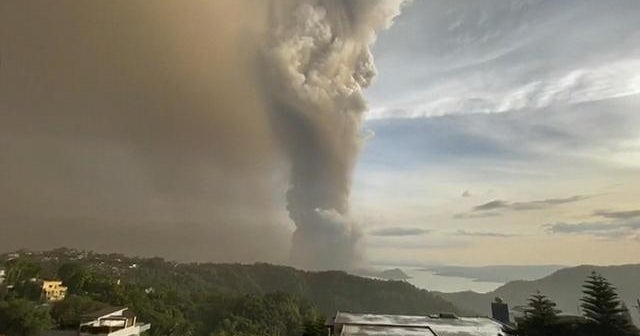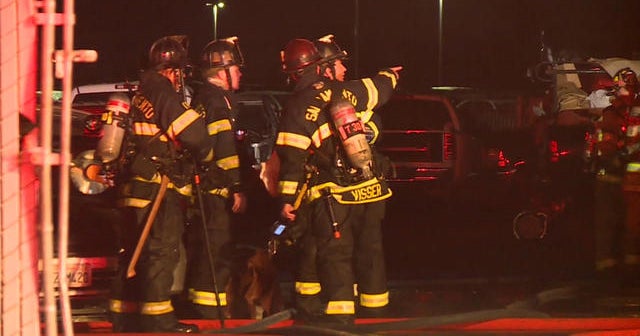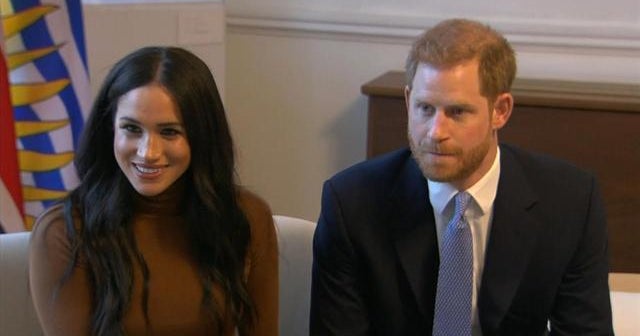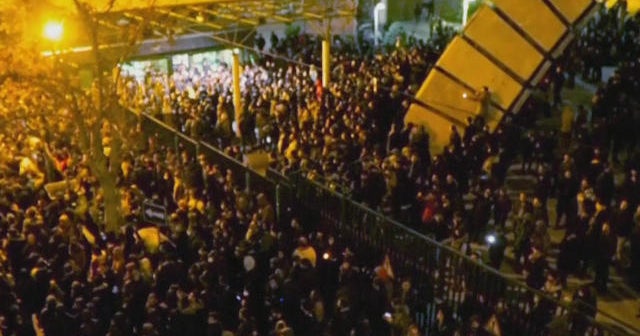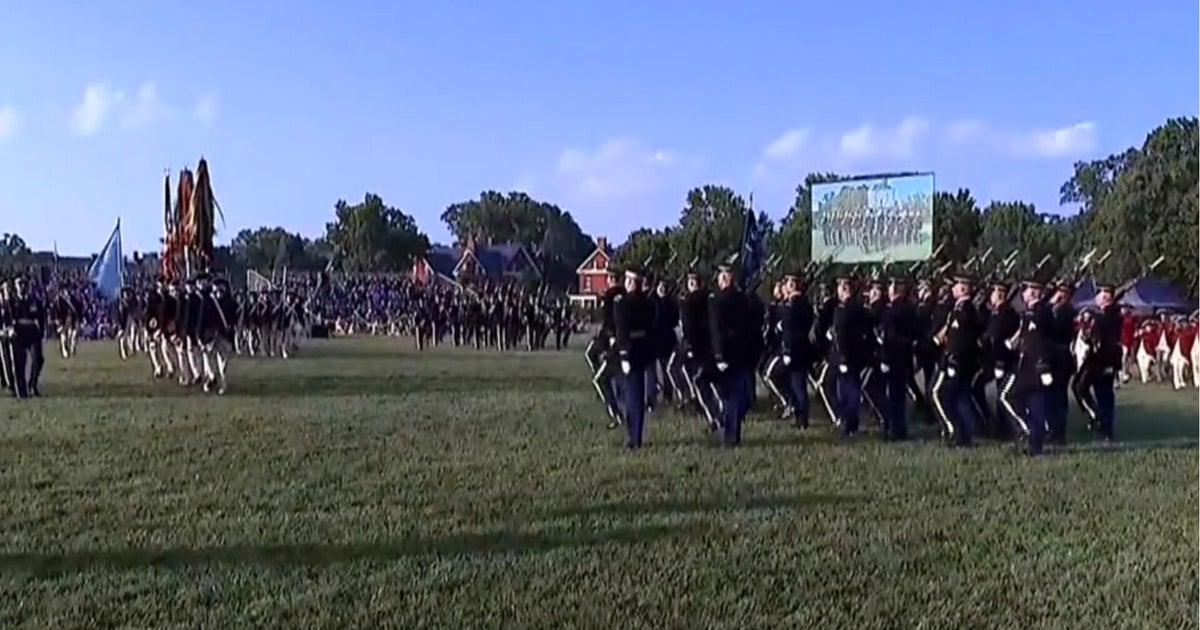The clock is ticking on President Trump's proposal to Iran to accept restrictions on its nuclear program — and possibly avert a potential military strike by Israel, which could involve U.S. support.
Israeli Prime Minister Benjamin Netanyahu spoke with Mr. Trump Monday regarding the diplomatic efforts and publicly announced Mr. Trump had told him Iran was expected to respond in the coming days.
In the meantime, Steve Witkoff, the president's Mideast envoy, plans to hold a sixth round of talks with Iran Sunday. Those talks will be held in the small Gulf state of Oman, according to a source familiar with the plans.
U.S. and Israeli officials confirmed diplomatic efforts are still underway, though multiple U.S. officials say they believe Israel may be preparing an imminent military strike against Iran.
On Thursday, the United Nations' Vienna-based nuclear watchdog, the International Atomic Energy Agency, stated that Iran is not complying with nuclear non-proliferation obligations. Iran swiftly condemned the finding as politically motivated.
Iranian Foreign Minister Seyed Abbas Araghchi, in a post on X, accused the UK, France and Germany, the three major European powers collectively known as the E3, of fomenting confrontation. The E3 remains a party to the 2015 international nuclear agreement known as the JCPOA. The U.S. withdrew from the agreement in 2018, and Iran partially withdrew in 2019. The European countries who remain party to the deal could seek to trigger the snapback of UN sanctions on Iran in the coming months.
"Another major strategic mistake by the E3 will compel Iran to react strongly," Araghchi said in the post.
Mr. Trump publicly declared on Truth Social last week that he would not allow Iran to enrich any uranium, but the White House has not so far not disclosed the contents of the nuclear proposal.
Nearly two weeks ago, Witkoff transmitted to Iran via Omani officials a proposal from the U.S. Two sources familiar with the details of that proposal told CBS News that the U.S. does not want Iran to develop any domestic enrichment of nuclear fuel for what it claims is a civilian program. To maintain that limited program, the two sources said Iran would have to procure the enriched nuclear fuel from outside the country, rather than enrich it on Iranian soil.
Mr. Trump and Russian President Vladimir Putin discussed Iran last Wednesday during a lengthy call that lasted over an hour, according to Mr. Trump's post on Truth Social. Mr. Trump said that time is running out on Iran's decision-making about nuclear weapons.
He said Putin "suggested that he will participate in the discussions with Iran" and that he could be helpful in concluding the talks. Tehran and Moscow have forged an informal military alliance in Ukraine, with Russian forces using Iranian-produced Shahed drones to bomb Ukrainian targets, including civilians.
Moscow could play a few roles in the negotiations with Iran, a source familiar with the proposal explained to CBS News. Russia could be a source for nuclear fuel purchase by Iran, for instance, or it could also be the receiving country for the storage of the existing enriched uranium produced by Iran. This would be similar to the role it played under the 2015 international nuclear agreement known as the JCPOA.
There are also other ideas proposed by the U.S., too. Axios was first to report that Oman suggested establishing a regional consortium to enrich uranium for civilian purposes under monitoring by the IAEA and the U.S. A source familiar with the proposal indicated that this was one of the ideas presented to Tehran.
During testimony before a Senate panel Wednesday, Defense Secretary Pete Hegseth fielded questions about the diplomatic efforts.
"There are plenty of indications that they have been moving their way towards something that would look a lot like a nuclear weapon," Hegseth said in response to a question about whether Tehran's nuclear program was peaceful. The powerful chair of the U.S. Senate Intelligence Committee – GOP Sen. Tom Cotton of Arkansas – appeared to seize on that statement in a social media post in which he said, "Iran's terrorist regime is actively working towards a nuclear weapon."
But U.S. intelligence assesses that Iran halted its nuclear weapons program in 2003. U.S. intelligence has also assessed that Tehran has continued since 2018 to enrich nuclear fuel at levels close to weapons grade. Due to that enrichment, U.S. intelligence assesses that Iran is currently a threshold nuclear state, which means it could decide to pursue a weaponization program within relatively short order.
Israeli Prime Minister Netanyahu has long been a skeptic of diplomatic attempts to restrain Iran's nuclear program and often points to documents stolen by the Mossad back in 2018 as evidence of past Iranian ambition to acquire its own nuclear weapon. Netanyahu has been pressing Mr. Trump to provide U.S. support for Israeli military action against Iran, arguing that Tehran is in a historically weak position, given the success of the Israeli decapitation of its militia Hezbollah and its decimation of Hamas in Gaza.
While Mr. Trump has held off on sanctioning Russia, which the administration has said is to avoid disrupting diplomatic outreach on Ukraine, he has sanctioned Iran amid an attempt at diplomacy regarding the nuclear program.
Last Friday, the Treasury Department announced sanctions against 30 individuals tied to two Iranian brothers alleged to have helped launder billions of dollars through front companies that the regime uses to help fund its nuclear and missile programs.
CBS News obtained a classified version of a report presented to member states by IAEA Director General Rafael Grossi. The report notes that Iran is the only non-nuclear weapon state in the world that is producing and accumulating uranium enriched to 60%, which remains a matter of serious concern. Uranium for civilian use is enriched to a much lower rate, between 3% and 5%.
Mark Dubowitz, of U.S.-based Foundation for Defense of Democracies, told CBS News that the report proved that "Iran is a serial violator of the [Nuclear Non-Proliferation Treaty], stonewalling the IAEA on its past — and possibly ongoing — nuclear weaponization work."
Dubowitz and other pro-Israel advocates are raising alarms and argue the Iranian regime should not have any right to enrich uranium on its soil.
The IAEA director general also reiterated in his report his call for Iran to cooperate with IAEA inspections — or risk "the Agency will not be in a position to provide assurance that Iran's nuclear programme is exclusively peaceful."
Israel has an undeclared nuclear weapons program, and the IAEA has no access to its facility at Dimona, which is believed to provide the fuel for its weapons program. The IAEA does monitor the site known as Soreq. At this point, Israel maintains a strategic edge as the only nuclear power in the Mideast.
The Standoff with Iran More Margaret Brennan


